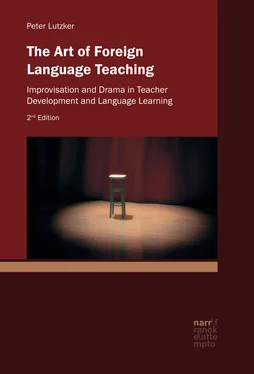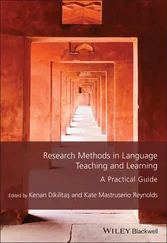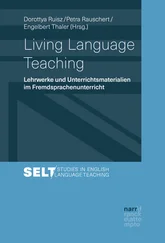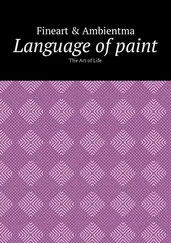i An Overview of Relevant Developments in Foreign Language Teacher Education and Language Learning
In examining and developing the concept of foreign language teaching as an art, I attempted to integrate the two closely related but nevertheless separate fields of foreign language teacher education and foreign language learning. The premise behind this was that the development of the artistry of the teacher was a necessary prerequisite for foreign language teaching as an art to be realized in practice. This led to the book being divided into two separate parts, each with its own background material, qualitative research study and its respective discussions and conclusions. At the same time, I attempted at different points and particularly in the final chapter to elucidate the underlying relations between these two different perspectives.
Accordingly, in attempting to review the relevant developments that have taken place in the last 14 years, I have been faced with the daunting challenge of reviewing large bodies of material in each of these fields, along with their own incorporation of related areas. Even after reducing these findings to those most directly related to the focus of each part of the book, there have been many new contributions to these fields which in the context of an extensive literature review would all deserve to be discussed in detail. However, for the above-mentioned reasons, I have chosen to focus on the work of a few leading institutions and individuals and afterwards to simply inform the reader of a number of further publications that appear to me to be the most relevant. The full bibliographical details of those publications that I have simply listed and not explicitly discussed, can be found in the bibliography at the end of the book. Moreover, I do not expect to have managed to cover all the material that could be considered. In fact, in making use of the wondrous possibilities of the internet, I also came across authors whose earlier writings I would have gladly incorporated into the original if I had known of their existence at that point. Considering the length of the book, perhaps it was just as well.
It seems appropriate to begin with two principal sources which have made significant contributions to ongoing developments in these areas. The online Journal Scenario, hosted by Cork University in Ireland, and the series of articles, books, conferences and networks which they have generated, have provided a unique contribution to the fields of drama in teacher education and drama in foreign language learning and, in a wider sense, of a performative approach to teaching and learning. The founders and driving forces behind this journal are Manfred Schewe from Cork University in Ireland and Susanne Even from Indiana University in the United States. Schewe has also been the author and editor of numerous leading articles, chapters and books. In conjunction with the entire Scenario Project, and through the efforts of Schewe and his colleagues, University College Cork also offers a broad array of Bachelors, Masters and Doctoral Courses which in highly innovative ways bridge the gap between the performative arts and education. Susanne Even is responsible for the artistic focus of the foreign language teacher program in the Department of Germanic Studies at Indiana University-Bloomington. She has also published widely, making the case for performative approaches in teacher education.
Since both Schewe and Even work in the field of teaching German as a Foreign Language, the Scenario journal and book publications are often available in both German and English. With their focus on drama and performative approaches they have continually succeeded in bridging gaps between the teaching of different foreign languages. The broad range of international contributors, both in their conferences and publications, attests to the global dimensions of this endeavor. Along with the ‘first generation’ of contributors who include longstanding and leading figures in these fields, a second younger generation has emerged as highly active both in their research and in a continuing series of publications, some of whose works will also be mentioned in this introduction.
Schewe’s explanation of the intentions of a performative approach to language teaching gives a clear picture of the guiding impulses out of which Scenario was created:
It is the intention of a Performative Foreign Language Didactics to avail of the wealth of forms found in the arts for teaching and learning purposes. It is, above and beyond the disciplines usually associated with foreign language teaching and learning (e.g., general pedagogy, first language didactics, psychology, linguistics and literature) actively seeking dialogue and exchange with the arts… (…) The goal of foreign language didactics is to create a new approach to teaching and learning whereby emphasis is placed on forms of aesthetic expression. This means that special attention is given to ‘language form’ and to the pleasure and even desire to play with words, sentences and expressions. ‘Form’ also implies the ways in which the body speaks and how sound, word, sentence and movement all interact with each other.1
In 2018, in the context of a Scenario Conference in Germany, a ‘manifesto’ was published in which the principles underlying the entire Scenario project were formulated:
Educators and students alike do not only communicate orally, but also use additional means of expression, so that they are involved in the creative teaching and learning process with their “head, heart, hands and feet” . The focus is no longer exclusively on results, but increasingly on the concrete teaching and learning activities from which lesson content is created.
The ability to experience empathy through a change of role and perspective , for example, by being in someone else’s shoes in role, is of central importance.
The educator initiates and supports democratic and participative learning processes and becomes a facilitator of learning processes in which students take on responsibility as autonomous co-designers and co-creators.
Competency is only fully acquired through practical application, i.e. experience. Performative methods can be used to simulate authentic contexts.
Knowledge acquisition requires space , i.e. an inspiring learning environment in which educators and students can move freely.
Sustainable learning requires time , i.e. an adequate pacing and distribution of topics and projects.
Mistakes are seen as learning opportunities. This requires rethinking the definition of assessment, as it would then no longer focus on penalising errors.
The whole world is a stage. (…)2 (emphases in original)
Another principal source of contributions to relevant fields is the online journal Humanising Language Teaching (HLT), hosted by the Pilgrims Organization formerly based in Canterbury and now in Oxford, England. Although not as specifically focused on the central themes of my work as Scenario, the range of what they have published under the umbrella of humanism has consistently included articles which have addressed these themes in different ways. A regular contributor and arguably the pioneer in introducing drama and different forms of performative and creative approaches to foreign language teaching is Alan Maley, whose seminal contributions to the field were first published in the 1970s and who has remained highly prolific to this day. His article on the occasion of the 20 thanniversary of HLT in 2019 both elucidates the importance of this journal and his own thoughts:
So why should we be celebrating the 20 thanniversary of HLT Mag?
The hegemony of testing and evaluation, the temptations of easy-fix technological solutions, the creeping encroachment of academic research at the expense of teaching expertise, the flat-lining of publishing, and the blight of bureaucratisation – all have contributed to a narrowing of the opportunities for teachers to explore independently the nature of learning and teaching and their role in it. In the face of this sometimes depressing scenario, HLT Mag has kept the flame of humanistic inquiry and experimentation burning.
Читать дальше












